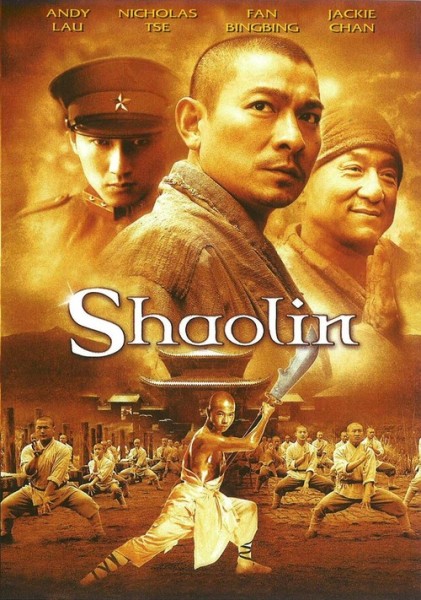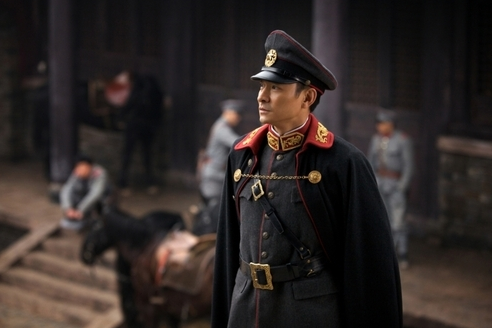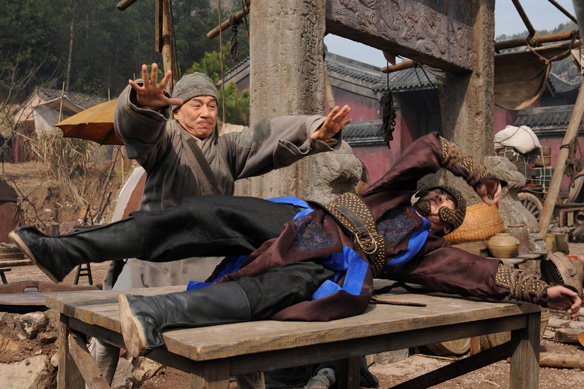SHAOLIN (2011)
(Directed by Benny Chan)
(Written by Alan Yuen, Chi Kwong Cheung, Quiyu Wang, Kam Cheong Chan and Tan Cheung)
(Starring Andy Lau, Nicholas Tse and Jackie Chan)
Plot: A ruthless Warlord (Andy Lau) decides to repent after his daughter is killed when he is betrayed by his second-in-command (Nicholas Tse). He joins the Shaolin Temple and becomes a monk, but his past won’t let him off so easy.
Review:
I’ve heard “Shaolin” described as the Hong Kong equivalent of “The Last Samurai”. While this is an oversimplification, the comparison is an intriguing one. Both are about lost warriors who join the culture they were sent to destroy and find peace for their wary souls. But they cannot ignore the past, so have to take up arms against the establishment they once served. The problem is that this is actually a fairly conventional story. Why isn’t “Shaolin” considered the Hong Kong equivalent of “Avatar”? Same premise, different setting. I suspect that the only reason we feel the need to compare this to “The Last Samurai” is that both movies deal with Asians. Despite this faulty comparison, I can’t help but do the same thing. I struggle with not saying: “If you liked “The Last Samurai”, you should appreciate this effort too”. Then I realize that I just said it and…shit…
“Shaolin” has a fascinating set-up, one that is so good that it becomes impossible for the movie to fully live up to it. Hou Chieh (Andy Lau) is a vicious Warlord with some villainous attributes, but it’s hard to completely dismiss him as evil. He’s merciless, traitorous, abuses his right hand man (Nicholas Tse) and engages in sacrilege. But he’s a family man who’s good to his daughter and wife (Bingbing Fan) and he also has a strong nationalist side. He knows that the British want to invade China from the inside and he doesn’t wish to betray his culture. His counterpart is Cao (Nicholas Tse),- his second in command- who is more upset when his troops are killed in battle (whereas Hou Chieh brushes this off) and cannot bring himself to kill an opposing Monk. His master berates him, often violently, so we can’t totally hate him for finally turning on Hou Chieh. His decisions aren’t based on malice. He’s just a really, really good student. Hou Chieh taught him to be vicious and Cao took those lessons to heart. The first act is filled with drama, comedy, action and intriguing characters/situations. But once Hou Chieh starts to develop, things begin to come undone.
The transition from bastard to saint is too abrupt to be described as ‘development’. It’s like there’s a switch that determines whether he’s a villain or a saint. There aren’t any stones thrown at him once he becomes a monk. I would’ve liked him to struggle more in achieving this form of enlightenment. Had his wife played a bigger role, maybe he could’ve had issues with his vows of celibacy. Maybe his inner warrior would cause him to fight his violent urges? Even Jet Li’s interpretation of the character from “The Shaolin Temple” had a stronger dilemma, and that was a straight up martial arts flick. They could’ve at least given more characterization to the other monks. Some don’t believe Hou Chieh deserves to stay with them. Maybe “Shaolin” could’ve also been about them realizing how they are just as capable of hatred and violence as he is. Two scenes after Hou Chieh joins the temple, the monks have embraced their former enemy as one of their own, so there goes that possibility for conflict. But whereas Hou Chieh eventually becomes a flat character, at least he’s consistent. The other monks are shown to be slaughtering their enemies during the finale, but no one ever calls them out on that hypocrisy. This is a major theme in the original “Shaolin Temple” and the characters ultimately decide that the right thing to do is fight for justice, even if that means they’ll have to kill some villains. But “Shaolin” never considers this dilemma. It continuously tells us that killing is wrong without offering any kind of counter argument, but shows us that apparently the monks don’t really believe in this. It’s not really played for irony, nor are they suggesting moral ambiguity. These are the good guys, but apparently they don’t practice what they preach.
That’s not to say that the second act is bad. It’s just not as good as it thinks it is. “Shaolin” tries way too hard to elicit pathos, while not offering much depth. The music is very sappy, yanking on our tear ducts every chance it gets. There are too many sequences where characters are just crying, or when slow motion is used to increase the drama, or when slow motion is used when people are crying. This- along with the HEAVY HANDED symbolism- made “Shaolin” seem too desperate. The dialogue is preachy and while I wouldn’t call it nonsensical, I rarely found it to be ‘deep’. Many critics (professional and amateur) praised it for being some sort of spiritual experience, but I have no idea where they’re coming from. I’ve heard this monkish jargon in plenty of other kung fu flicks, so what makes this more special? Was it the nice production values? Maybe critics just love wacking off to symbolic imagery. Of course, emotional reactions are unpredictable and uncontrollable, so I won’t fault anyone for making a connection to the film. On the flip side, the movie usually succeeded at making me laugh. I pointed out that “Kids from Shaolin” had a distinctly Chinese sense of humor, but I think I may have generalized too much. That is a kids film from the 80’s, not a representation of Chinese (comedic) cinema as a whole. “Shaolin” is more low key with its humor and that made it amusing, but never in a way that betrayed the tone. Furthermore, the actors often sold the preachy dialogue, so sometimes I WOULD feel something on an emotional level.
Everything starts to pick up again during the third act. The Shaolin Temple gets invaded, leading to an epic finale that’s just stunning. Canon fire tears into the temple, explosions surround the various fighters, before blowing them sky high…It’s haunting and poetic. Actually, “Shaolin” does a good job at balancing drama and action. For all the tears, philosophizing, speeches and all around melodrama, there is quite a bit of fighting going on. The fights are perfectly placed within the narrative, so the movie never goes on long without some sort of battle. But it’s not overly reliant on them either, which might be why the critics embraced this. It might have kung fu, but it’s not necessarily a kung fu movie. Despite the key players not being real martial artists, the choreographer did a great job at covering this up. There are a lot of stylized techniques, everyone moves fast and there’s enough diversity so they never become redundant. Amusingly, Jackie Chan has a small role, but his character doesn’t know kung fu. That doesn’t stop him from having a pretty cool fight near the end that’s very Jackie Chan-ish. It made me squee. There are some large scale battles and I actually found myself appreciating the use of guns. Their presence provided some black humor and it was probably one of the more original aspects of the film. “Shaolin” isn’t perfect, but it is pretty entertaining.
So let’s return to the opening paragraph: “Shaolin” is very conventional at its core. It’s filled with cliches, even if it has some unique touches. I felt it lacked the prestige of similar films, like “The Last Samurai“, “Dances with Wolves” and even “Avatar“. The filmmakers attempted to distract me from its familiarity by waving symbolic imagery in front of my face and saying a bunch of philosophical words without ever engaging me in an actual conversation. The critic in me wishes to take its symbolism, shape it into a phallic object and shove it up the directors ass. Yet I can’t bring myself to do that. While I think it failed in its attempts to be great, at least it provided a lot of action. Whenever I would roll my eyes at the drama, a fight scene WOULD distract me from its nest of cliches. I would allow myself to be taken away by the gorgeous production values, the surprisingly good choreography and the inspired cinematography. Benny Chan might’ve not succeeded at making anything deep or moving, but he did succeed as an action director. Plus, occasionally all that yanking on my heart strings would occasionally make me sniffle. Personally, I thought “Shaolin” was okay. Yet I also wish it was better. I liked many of its ideas and it had all the potential to be great, but just didn’t pull it off. Maybe next time, Benny. Maybe next time…
Also, take warning: Horses will NOT like this movie. The poor creatures…
Violence: Rated R. It’s not too graphic, but it is violent.
Nudity: I don’t remember any.
Overall: “Shaolin” is good enough that it warrants a viewing, but don’t expect too much out of it. I thought it was just a decent epic.
Rating: 2.5/4 






